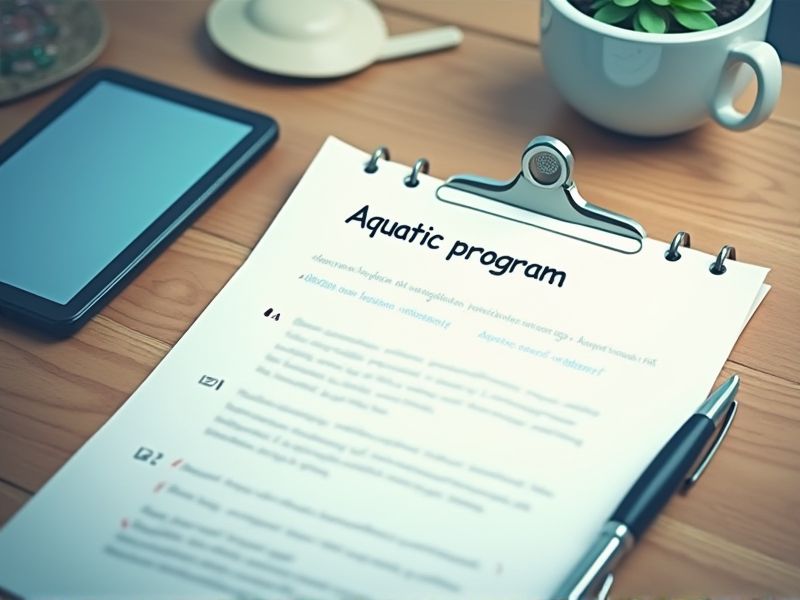
Aquatic program instructors play a crucial role in ensuring participant safety and skill development in water-based activities. Various certifications validate their expertise, equipping them to handle emergencies, teach swimming techniques, and maintain a safe aquatic environment. These certifications often include knowledge in CPR, first aid, and specific water safety protocols. Key certifications that may be required for aquatic program instructors include Lifeguarding and Water Safety Instructor credentials.
American Red Cross Lifeguard Certification
The American Red Cross Lifeguard Certification ensures that aquatic program instructors possess the necessary skills in water safety and rescue techniques. This certification provides a standardized level of competence in CPR, first aid, and emergency response, which is crucial for handling potential emergencies. Instructors with this certification contribute to a safe learning environment, essential when overseeing water-based activities. Organizations often require this certification to meet legal and insurance requirements, reducing liability risks.
American Red Cross CPR/AED Certification
Holding an American Red Cross CPR/AED Certification ensures an aquatic program instructor can promptly respond to emergencies, safeguarding participant safety. The certification increases confidence in managing life-threatening situations like cardiac arrest, which are critical in aquatic settings. Employers often require instructors to have such credentials to meet regulatory compliance and insurance requirements. This certification also reflects an instructor's dedication to maintaining high professional safety standards.
American Red Cross First Aid Certification
The American Red Cross First Aid Certification is essential for aquatic program instructors because it equips them with the necessary skills to manage emergencies, ensuring the safety of participants. Instructors with this certification are better prepared to treat injuries or medical conditions that may arise in an aquatic setting, such as cuts, sprains, or aquatic-related incidents like near-drowning. Having certified personnel on staff reduces liability risks for aquatic facilities and enhances their reputation for prioritizing safety. Organizations often require this certification as part of meeting industry standards and best practices for aquatic instruction safety.
American Red Cross Water Safety Instructor Certification
The American Red Cross Water Safety Instructor Certification ensures instructors possess the necessary skills to effectively teach water safety and swimming techniques. This certification establishes a standardized level of competency, reducing the risk of water-related incidents during aquatic programs. Holding this certification enhances the credibility of instructors, thereby increasing trust among program participants and their families. Certified instructors are equipped to design and implement comprehensive aquatic programs that adhere to best safety practices and current industry standards.
American Red Cross Aquatic Facility Operator Certification
Obtaining the American Red Cross Aquatic Facility Operator Certification ensures that aquatic program instructors are equipped with advanced knowledge of pool management and safety standards. This certification addresses the need for instructors to understand proper water chemistry and filtration, which directly affects the health of participants using the facility. It provides training in risk management strategies, reducing the likelihood of accidents or injuries. Additionally, possessing this certification can enhance an instructor's credibility and employability within aquatics programs, aligning with industry expectations for qualified personnel.
Adaptive Aquatics Certification
Adaptive Aquatics Certification equips instructors with specialized skills to safely teach swimming to individuals with disabilities, reducing the risk of accidents. Programs with certified instructors are better able to tailor their approach, leading to improved learning outcomes for participants. This certification ensures instructors are familiar with a range of adaptive techniques and equipment, enhancing inclusion in aquatic activities. Organizations offering such programs can more effectively meet accessibility standards, broadening their service appeal.
National Pool Operators Association Certification
Obtaining the National Pool Operators Association Certification equips aquatic program instructors with critical knowledge about pool safety and maintenance, which helps prevent accidents and ensure a safer environment. A certified instructor better understands water chemistry and sanitation, reducing the risk of waterborne illnesses amongst swimmers. Being certified instills trust among participants and their families, impacting program enrollment positively by demonstrating professionalism and commitment to safety standards. Institutions often require certification to comply with regulatory standards and liability insurance requirements, ensuring adherence to best practices within their facilities.
YMCA Aquatic Safety Certification
YMCA Aquatic Safety Certification is needed because it ensures instructors are equipped with essential lifesaving skills, minimizing the risk of accidents during aquatic programs. This certification guarantees that instructors understand and can effectively execute emergency response protocols. By meeting rigorous safety standards, certified instructors foster a secure environment, thus increasing participant confidence and program participation. The certification is a recognized benchmark for maintaining a high level of competency, crucial for both legal compliance and organizational reputation.
American Swimming Coaches Association (ASCA) Aquatic Program Certification
The ASCA Aquatic Program Certification ensures instructors possess a standardized level of expertise, enhancing the quality and safety of aquatic programs. This certification boosts instructors' credentials, making them more attractive to employers and clients seeking reliable instruction. Knowledge from ASCA helps instructors develop tailored training plans, effectively addressing diverse participant needs. Certification also demonstrates a commitment to professional development, fostering trust among program participants and industry peers.
Emergency Medical Technician (EMT) Certification
An EMT certification equips aquatic program instructors with essential life-saving skills, enhancing their ability to respond effectively in emergency situations. Aquatic environments present unique risks, including drowning and water-based accidents, necessitating specialized emergency response training. The certification ensures instructors can provide immediate medical assistance, crucial in minimizing injury severity and improving patient outcomes. Employers often require instructors to hold such certifications to meet safety regulations and ensure participant well-being.
Summary
When you become an aquatic program instructor with certifications, you enhance your credibility and attract more clients. This, in turn, increases enrollment in your classes, boosting your income. Your skills improve, leading to more effective teaching and better student outcomes. Employers view you as a qualified and reliable professional, opening doors to more job opportunities.
